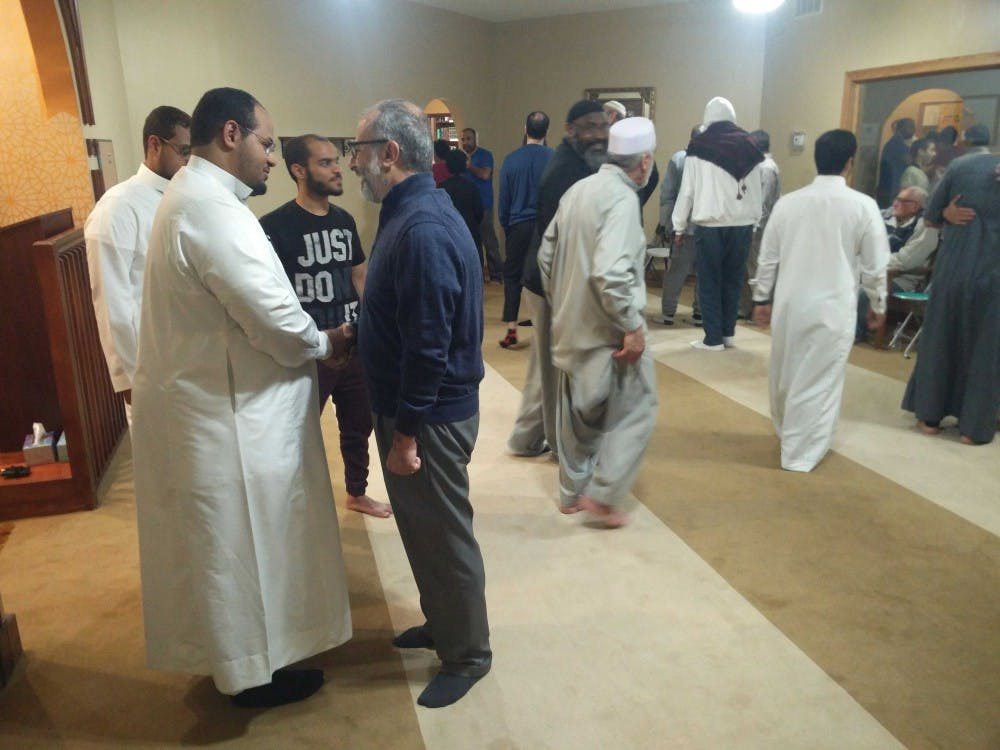A little over 40 people stood in parallel lines, with their arms folded and heads bowed down as they faced toward Mecca, Saudi Arabia, and engaged in the “Isha’a” prayer followed by an additional “Tarawih” prayer 10 p.m. Sunday at the Islamic Center of Muncie.
These prayers, led by Anas Almassrahy, graduate urban and regional planning major, marked the first gathering of Muslims in the Muncie community since the start of this year’s Ramadan, the Muslim holy month marked by daily fasting from dawn to sunset.
To Almassrahy, Ramadan is a time for “change and resilience,” which he said the entire Muslim community participates in observance of the holy month.
“People from all scopes of life … people from different backgrounds, they are here to observe worship,” he said. “People observe this worship in unity.”
Bibi Bahrami, president of the Islamic Center, said Ramadan is an opportunity, a blessing and “a gift sent by God to humanity.”
“I look forward to strengthening my own faith, that connection, discipling our personal desires and to be able to control it,” Bahrami said. “I enjoy Ramadan plus the social part — family gatherings when the community gets together.”
Ramadan is one of the five pillars of Islam that people are encouraged to particpate in together, Almassrahy said.
“Ramadan is bounded by time but not bounded by place. Certain worship is encouraged to be done in a group and congregation,” he said.
Leading the prayers at the mosque is also part of Almassrahy’s summer internship of taking up a community-development role in Muncie’s Muslim community under the Department of Urban Planning.
Some other aspects of his internship include sharing his knowledge from the Quran, reciting it correctly especially for those who aren’t well versed in Arabic, and trying to organize events for the local Muslim community and vistors.
“This is an experience for myself to work in a specific type of community [for] strengthening the ties,” Almassrahy said.
One event he intends on organizing is a workshop for Muslims in the Islamic Center training the community on how to react in an active shooter situation.
“The doors are all glass. There’s a sign that says camera security. But [if] we have somebody just walking in, that would mean a terrible situation,” Almssrahy said reasoning why he’d like to conduct the workshop.
Abdelaadim Bidaoui, assistant professor of Arabic and French modern languages and classics, said the month-long commitment helps Muslims become closer to God and becoming healthier through controlling one’s desires.
“One of our bad desires is food. We want to eat [and] we want to drink at all times,” Bidaoui said.
He said the fast is taken seriously because unlike a New Year’s resolution, the fast is “between you and God.”
“Ramadan is also an opportunity because I have access to food at all times [and] you would never think of the homeless,” Bidaoui said. “It's by experiencing hunger, that you become aware of the needy.”
Bahrami described the 16 to 17 hours spent without eating or drinking as “a special moment,” where “you remember those who are hungry” and “you appreciate hunger.”
She said members of the community also serve food for Ball State students and other people who live here away from their families.
“They send home-cooked food every night. The community is very proud of doing that,” Bahrami said. “Everybody takes turns in such a unifying way.”
She also plans on hosting the annual iftar dinner, the breaking of the daily fast during Ramadan, with Muncie’s mayor this year.
Previous community dinners with the mayor have been open to the Muncie community “to let them know they’re welcome to join in and also for educational and understanding purposes.”
Mubasher Khan, sophomore marketing major and treasurer of the Muslim Students Association, said he felt Ball State does enough to make Muslims in Muncie, but there could be more awareness.
“[Some] people in Ball State, they don’t know exactly what a Muslim is or what the Islamic religion is,” Khan said. “They can see the real image of Muslims instead of the bad ones that are shown on the media.”
Contact Charles Melton with comments at cwmelton@bsu.edu or on Twitter @Cmelton144. Contact Rohith Rao with comments at rprao@bsu.edu or on Twitter @RaoReports.





